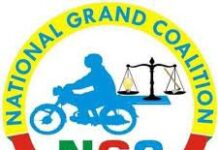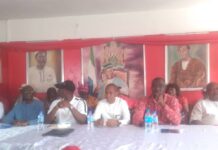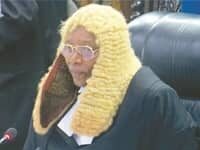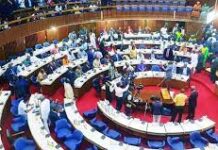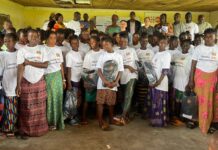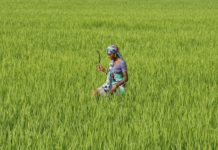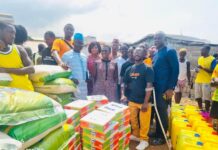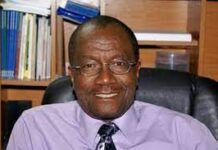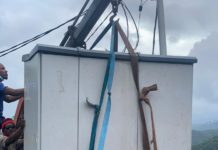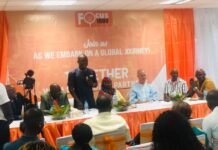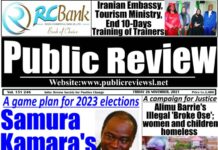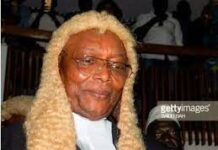The Minister of Information and Communications Honourable Mohamed Rahman Swaray made an inspection tour of the New NATCOM Building at Hill Station today, Thursday 26th August 2021.
The Minister was joined by senior staff of the Ministry which includes the Permanent Secretary Mr. Kwame Yankson, Acting Director of Communications Mr. Mumini Jalloh and the Director General of NATCOM Mr. Daniel Kaitibi to inspect the progress of the building.
The visit was primarily initiated by the Minister to see how far the work has gone as a supervisory Ministry and most importantly to provide a space in the building for the installation of the National Computer Security and Incidence Response Team (NCSIRT) to enable tracking down of cybercrimes.
It would be recalled that Parliament unanimously enacted the Cyber Security and Crime Act 2021 this year and one of the key components of the Act was to provide a National Computer Security and Incidence Response Team to track down cybercrimes.
The NCSIRT will be supported by ECOWAS and EU to serve as the national infrastructure to strengthen the fight against cybercrimes and related matters. The government of Sierra Leone should provide the office space for the installation of NCSIRT.
The Director General of NATCOM identified a space to the Minister which was examined by the Acting Director of Communications and it was approved by him.
According to Minister Swaray, there is an ongoing training for Judges and law enforcement officers on how to handle matters related to cybercrime. The Minister added that, eight (8) Sierra Leoneans were sent on training in Accra, Ghana on how to operate and handle the NCSIRT. “We are far ahead and ready as a nation to receive this installation,” the Minister asserted.
The Cyber Security and Crime Act 2021 await the assent of the President.
Pademba Road Prison to be Relocated
By Bampia James Bundu
The Minister of Internal Affairs Mr. David Panda Noah has revealed that his Ministry is working on relocating the Pademba Road Male and Female Correctional Centers to Songo village. He made this disclosure at the weekly government Press Conference held at the conference room of the Ministry of Information and Communications 8th Floor Youyi Building in Freetown on Thursday 26th August 2021.
The Internal Affairs Minister explained that the current location at Pademba Road in Freetown is not ideal to maintain a maximum correctional centre. He said the Prison has become part of the central business district and other buildings are overlooking it, making it unfit for its present location.
He furthered that It is also not good for the general public living around that area, in the event of a prison break or attempted prison break. Often times, it is difficult for security personnel to effectively man or cordon the area as required because of other residents around the area. Inmates can mostly be difficult to control in such eventualities.
Minister Noah revealed that the maximum prison was built for 324 inmates but it is currently housing over 1,500 inmates. He gave a breakdown of the current occupancy as follows;
Howard 72,
Blyden 72,
Clarkson 72,
Wilberforce 72,
Condemn and separate cells 14,
Remand 22,
Total= 324.
“Separating inmates is difficult due to the lack of space in the center. That and many other reasons have prompted us to relocate the prisons to a more suitable location where they will be categorised,” he said.
Mr. Noah added that they have already secured a piece of land in Songo and by December of this year, all ground work would have been completed for the start of the construction of the new prison.
He revealed that relocating the center will also decongest the central business area, and allow for the construction of modern facilities in the CBD. More development programs and projects in the community such as schools, market, electricity, water supply, courts, etc. can be undertaken without much headache.
Minister Noah promised to engage relevant stakeholders to ensure that a buy-in for the relocation of the Pademba Road Correctional Centre is sought. In order to avoid any problem and backlash, government will conduct land surveys, produce draft conveyance for signatures, install beacons, and negotiate and determine compensations for land owning families.
The Minister used the opportunity to caution all government officials who are in the habit of covering their number plates as they move around the country to desist.
He described such an act as a chargeable offence and called on the police to arrest anyone in contravention of the law.
“I have instructed the security sector to arrest anybody caught in the act of covering their number plates. Irrespective of who the individuals are, they will face the full force of the law,” he said.
PUBLIC REVIEW ARTICLE
PONDER MY THOUGHTS
BY
Andrew Keili
LEONE REDENOMINATION: THE OLD DOG HAS A NEW NAME
The First Law of Economists: For every economist, there exists an equal and opposite economist. The Second Law of Economists: They’re both wrong.
It’s no wonder that economists tend to get such a bad rap. Nobody truly understands what they do and how they do it. Central Bank Governor, Professor Kelfala Kallon has done his best since his appointment to lecture a long suffering populace on the bold steps he would often take to put our economy on an even keel. When you think about it, however, it can’t be fun being in his job which involves examining a system of several moving parts and trying to make sense of it all. Macroeconomics is too complex a discipline to be completely understood especially in the Sierra Leone context. His latest action to redenominate the Leone has dominated recent national discussions.
Let me straightaway get off the fence and give my opinion as an admirer of the economist profession- On the one hand it is good, but on the other hand it may not be good!
The Leone will be redenominated by removing the three last zeros of the face value of Le1,000, Le2,000, Le5,000 and Le10,000 bank notes so that the face value of bank notes will become Le1, Le2, Le5 and Le10. Moreover, there will be a new Le20 bank note. There will also be coins with a smaller face value. The Bank Governor says the new measures are aimed at increasing productivity, reducing transaction costs, discouraging hoarding and reducing risk of carrying large amounts of cash. He adds that the redenomination might force cash hoarders to return their huge amount of cash back to the banking system and also create a positive psychological effect on Sierra Leoneans.
Although his optimism may be borne out by the practice of redenomination in many other countries like Ghana, there could be adverse effects. Petty traders, taxi drivers, food sellers and other businesses of that category could be inconvenienced with lack of change, which could in turn, lead to frequent rounding offs and thus, eventually fuelling inflation. There are other fears related to introducing redenomination under our prevailing economic circumstances. Historical evidence suggests that redenomination had been very successful in an environment of macroeconomic stability, declining inflation, stable exchange rates, fiscal restraint and prudence and rational expectations of policy credibility. The IMF and other credible groups are in agreement that no currency redenomination theory can transform the economy where mass unemployment persists, currency depreciates in value, imports exceed the exports, local industries are collapsing, and cost of production is prohibitive.
With these caveats in mind, let us examine our economy more closely. Sierra Leone’s economy contracted by 2.2 percent in 2020 as the services sector shrank by 13 percent due to the combined adverse effect of international and domestic restrictions on trade, travel and tourism. The economic costs of the COVID crisis have exacerbated the already-tight fiscal financing and strained debt position. The high level of nonperforming loans (NPL) in Banks poses a financial stability risk and many businesses are hurting. The current NPL ratio of 18.5 percent is much too high. The pandemic has substantially worsened food insecurity and poverty. Sierra Leone imports much of its food and other essential goods, including an important proportion of its main staple, rice. The number of people who are food insecure has increased significantly since the pandemic began, from about 50 percent to about 60 percent of the population, due largely to reduced incomes and higher food prices. Although exports are expected to recover soon, such a recovery may be much slower than bullishly thought. Without the emergency support provided by development partners to keep our economy afloat, things would have been much worse.
There have been some challenges faced by the Central Bank for which answers provided by the Governor have not been entirely satisfactory. The acute shortages of currency in 2020, which still occasionally occur, the reversal of policies related to capping in retention of dollars and many others are testament to the fact that even with the best of intentions, other factors thwart the Governor’s efforts at macroeconomic stabilisation. The largely informal nature of our economy, smuggling of precious minerals, the vagaries of sub-regional trading, near-cartel control of certain sectors and general idiosyncrasies of unsavoury business people and other unknown factors make such a feat extremely difficult.
Redenomination is normally carried out in conjunction with a comprehensive program of economic growth. Already, however, it would seem some panic is setting in. Since the announcement, the currency has significantly depreciated against the dollar and prices are rising. The following comment by a respected journalist vividly illustrates this:
“Bank Governor seems to have shaken the can of worms-all the prices are now flying-dollar has hit Le1,120 from Le 1,012, and nobody is selling. Everybody is buying-cement now Le 110,000 per bag and this is just the beginning.”
Another respected businessman notes:
“This is one of the consequences I mentioned about redenomination and done during a period the diamond market is on a vacation in Belgium and Israel as is always the case from July to September…less forex in flow as diamond price is normal dropping by 10% during this period.”
It is clear that there are many factors coming into play which affect our economy that may need to be factored into the Governor’s thinking.
But all is not lost. The Governor obviously has his detailed plans for implementing the redenomination and if followed through properly, things may work out well. It is worth learning from the example of Ghana which did its last redenomination in 2007 as noted in one report.
“The old cedi and the new cedi traded side by side for the period of six months, started from 1st July 2007 to 31st December, 2007. By the close of December 2007, the old cedi was not regarded as a legal tender and it was illegal to use the cedi to purchase items after December 2007. However, after the six (6) months transition period, the old notes and coins were exchanged at the Bank of Ghana and any commercial and rural bank but were not regarded as a legal tender and therefore would not be used for trade and other transactions. The old and the new notes and coins had the same external value. On the 1st July 2007 businesses were obliged to show prices in both the New Ghana Cedi and the old Cedi. By the end of 31st December, 2007, all private and governmental organizations affected by the change needed to harmonize all their computer software and ATMs. Pos terminals and other processing systems that can 21 transform all existing accounts to the New Ghana Cedi.”
It would also seem that there are many things to consider. The use of currency redenomination as a mechanism of confiscation must be guarded against. Setting maximum limits to currency returned to the bank and shortening the time frame significantly to “catch people out” must be carefully thought through. The unnecessary politically motivated veiled threats and finger pointing against perceived hoarders is unhelpful. The public must be given sufficient ability to exchange old cash for new. The danger of such practices is that instead of exchanging for a new currency, the population will invest shadow money in foreign currency, precious minerals and real estate. And such cash flows cannot be controlled as we have already started seeing.
A crucial factor in determining the success of this event as we have seen from the Ghanaian situation is awareness-raising among the population.
On the positive side, whatever the vagaries and the difficulties, most of us will be rooting for this project to succeed. The sheer volume of out worthless notes we carry in “Ghana must go” bags, the Bank clerks who spend an inordinately long time counting smelly notes and other disadvantages will thankfully be a thing of the past.
The transition must be managed well and we hope the Governor is definite about his plans. According to the Governor, productivity could be increased by providing incentives for Sierra Leoneans to think they are better off compared to before the redenomination, a feeling that might motivate them to work hard or produce more. However, without getting the economic fundamentals right, increasing exports and having a vibrant private sector, such optimism may be misplaced and poor people before the change will still remain poor.
Giving the “old Leone dog” a new name will only succeed with proper planning and education and getting the economy right. Actually, it’s easy for a newly adopted dog to learn a new name. Don’t feel that a dog cannot learn a new name completely dissimilar to its previous name. A dog of any age can learn a brand new name within a few days. Governor Kallon and his team need to do much more than giving an old dog a new name.
Ponder my thoughts.
REVISITING THE 11 KEYS TO STATEHOUSE- A MODEL FOR PREDICTING PRESIDENTIAL ELECTIONS IN SIERRA LEONE
By Mustapha Wai
U.S.A.
August 28, 2021
On July 17, 2017, I published an article titled “The 11 keys to Statehouse- A Model for Predicting Presidential Election Outcome in Sierra Leone.” Modelled after American University Professor, Allan Litchman’s popular U.S. election prediction model, the 11 keys were carefully derived using analysis of historical patterns exhibited by several independent variables, to predict the outcome of presidential elections in Sierra Leone. Historical patterns show that the key variables selected provide reliable evidence which has consistently predicted the outcome of each post-war multi-party presidential election in the country.
The 11 keys basically assess among others, the state of the country’s economy and security; donor confidence in the incumbent administration; the political landscape and by-election results in the months leading to the election; the strength, capacity, and internal unity of parties leading to the election; track record, appeal and likability of presidential candidates; regional balance of presidential tickets; and campaign strategies and election management capacities of parties. Six or more “Yes” answers to these questions indicate that the incumbent candidate or party will be elected. If six or more of the 11 key questions result in “No” answers, the incumbent candidate and party in power is predicted to lose the election to the opposition.
Using this model, the 2018 presidential election was correctly predicted. Below are the answers to the 11 keys predicting the 2018 presidential election in Sierra Leone.
Key #1: By-Election Results- Did the incumbent party genuinely win a significantly greater number of by-election races conducted in periods leading to the general election?
Answer: No
Key #2: National Crisis, Popular Unrest or Coup- Is the preceding term of the incumbent free of a poorly managed national emergency crisis, popular unrest, or coup d’état?
Answer: No
Key # 3: Supply and Affordability of Basic Necessities- Are basic necessities such as food, electricity, and transportation reasonably available in supply and affordable especially in periods leading to the election?
Answer: No
Key #4: Incumbency Advantage- Is the incumbent president at the top of the incumbent party ticket?
Answer: No
Key #5: Third Party Scenario- Is the chance for a third party to pick up significant votes in the strongholds of the incumbent party or in key swing-districts remote?
Answer: No
Key #6: Internal Division and Breakaway- Did the internal election or selection of a candidate for incumbent party go without major contentions, unresolved disputes and/or breakaway by a significant number of the incumbent party stakeholders and members?
Answer: Yes
Key #7: Donor Community Confidence- Does the donor community have more confidence in the incumbent party and candidate than the alternative presented by the opposition?
Answer: No
Key #8: Presidential Candidate’s Personal Appeal, Popularity and Record- Does the incumbent presidential candidate popular, has mass appeal, is likable, and has a relatively good public record and personal character that is free of major scandals compared to opponents on the ticket of the main opposition party?
Answer: No
Key #9: Regional Balance of Presidential Ticket- Is the presidential ticket of the incumbent party occupied by individuals that represent a reasonable regional and ethnic balance?
Answer: Yes
Key #10: Weak and Divided Opposition- Is the main opposition party experiencing major unresolved disputes over the election or selection of the presidential candidate and/or a breakaway by a significant number of disgruntled party stakeholders and members?
Answer: Yes
Key #11: Campaign and Election Management Capacity- Does the incumbent party have a better campaign and election management capacity (people, process and logistics) compared to opposition parties combined?
Answer: No
With only three “YES” answers, the model predicted that the incumbent party’s candidate will lose the 2018 presidential election. The outcome of the 2018 election proved this model right.
Ahead of the 2023 election, and after all major parties shall have elected their presidential candidates and chosen running mates, this model will be used again to predict the outcome of the 2023 presidential election.
©By Mustapha Wai
PUBLIC REVIEW SPORT
SLFA Boss Graces FAFA Finals & Inspires Young Talents
The President of the Sierra Leone Football Association Thomas Daddy Brima on Sunday August 29 graced the grand finals of the Fourah Bay Amateur Football Association (FAFA) Non-Division League between Dream Football Foundation and Liverpool Football Club Sierra Leone.
Accompanying the SLFA President to the Fourah Bay community playing field were the Director of Cooperate Affairs- Mohamed Benson Bawoh, Western Area Football Association Secretary General- Benjamine Gooding and Chairman of the Premier League Club East End Tigers- Victor Lewis.
The SLFA President Thomas Daddy Brima in his opening statement thanked the Fourah Bay Amateur Football Association (FAFA) Executive for for keeping the non-division football alive and competitive throughout these years. “This level of football is very important in the development of the game as it creates the platform for young and undiscovered talents to be spotted”. He said. “A good number of National Teams players today went through this league system. The Football Association recognizes your role in the development of grass-root football and I would like to encourage others across Sierra Leone to emulate your good work as we assure you SLFA’s unflinching commitment in promoting the game at indiscriminately all categories and levels”. President Brima added.
He ended his statement by encouraging the young footballers to pay attention to the game and respect their coaches as they chase their dreams of becoming the next football stars in Sierra Leone, adding that, “the game of football goes with discipline and respect”.
Speaking to this medium, the Secretary General of the Fourah Bay Amateur Football Association (FAFA)- Alhaji Abdulrahaman Davies expressed great delight playing host to the SLFA President at the Fourah Bay Community Playing Field. “I am very pleased to see the SLFA President honoring our invitation. Is shows that the FA recognizes our efforts in promoting football at the grassroots level”. Davies said.
Dream Foundation FC won this year’s non-division competition and were crowned champions as they defeated Liverpool FC Sierra Leone by two goals to nil.




